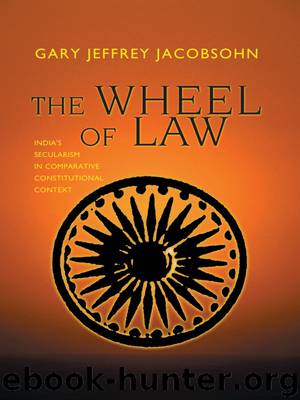The Wheel of Law by Jacobsohn Gary J.; Jacobsohn Gary J. J.;

Author:Jacobsohn, Gary J.; Jacobsohn, Gary J. J.;
Language: eng
Format: epub
Publisher: Princeton University Press
Published: 2009-04-07T04:00:00+00:00
Chapter Six
CORRUPT PRACTICES
Religious Speech and
Democratic Deliberation
SEVERAL YEARS AGO, the governor of Mississippi made what many people thought was an outrageous observation when he asserted that America was a “Christian nation.” For the outraged, few statements could have matched the governor’s in what it revealed about a political leader’s fundamental disregard for the essentials of American democracy.1 The governor, however, had no need to fear political retribution; after all, the intensity of the outrage precipitated by his statement correlated strongly with the distance one traveled from his state. Nor had he any need to fear any serious legal repercussions, it being quickly evident that a principled defense of his right to utter silly and offensive things was most likely to be found among those harboring the gravest misgivings about his questionable characterization. Moreover, he would no doubt have enjoyed the same immunity had he gone on to suggest that voters withhold their support from any candidate for public office whose faith was other than that of the favored Christian majority.
American social norms explain why the governor could feel politically secure in his job, just as American constitutional norms explain why there is no mystery in the governor’s presumed confidence regarding possible legal liability. Thus we expect controversial speech to be sheltered by the speech clause of the First Amendment, and we assume further that the religious liberty guarantees of that Amendment would, in the case of the governor’s remarks, augment this already considerable constitutional protection.2 Justification for these expectations is well grounded in American constitutional jurisprudence. At the same time, skepticism about the normative standing of religiously inspired speech has become a subject of some controversy among contemporary theorists of liberal democracy.
In this chapter I remove this controversy from the realm of abstract theory and place it within a comparative constitutional framework. The comparative focus provides a richer context for a general understanding of the political interface of spiritual and temporal concerns, but also for its more particular manifestations, as in the vexing problem of religious speech in the public forum. Thus in India a politician who, while campaigning for office, voiced analogous sentiments to those expressed by the governor would be vulnerable to serious legal challenge. The possibility that such a challenge would be upheld by the courts provides an opportunity to further explore the constitutional implications of ameliorative secularism, and in the process to reconsider the argument for public reason, which, as it has been advanced by John Rawls and others, appeals to certain constitutional essentials of a liberal polity to derive guidelines for the appropriate discourse of democratic politics.
The Indian case suggests that the way in which we conceptualize the relationship between religious argumentation and democratic deliberation must take stock of the diversity of experience in constitutional arrangements for religion and politics. As we have seen, the commitment to secular democratic institutions may express itself in different ways, which means that the attempt to frame norms of public reason with reference to the constitutional essentials of a liberal
Download
This site does not store any files on its server. We only index and link to content provided by other sites. Please contact the content providers to delete copyright contents if any and email us, we'll remove relevant links or contents immediately.
| Anthropology | Archaeology |
| Philosophy | Politics & Government |
| Social Sciences | Sociology |
| Women's Studies |
The Secret History by Donna Tartt(16682)
The Social Justice Warrior Handbook by Lisa De Pasquale(11497)
Thirteen Reasons Why by Jay Asher(7810)
This Is How You Lose Her by Junot Diaz(5806)
Weapons of Math Destruction by Cathy O'Neil(5058)
Zero to One by Peter Thiel(4841)
The Myth of the Strong Leader by Archie Brown(4797)
Promise Me, Dad by Joe Biden(4463)
Beartown by Fredrik Backman(4447)
How Democracies Die by Steven Levitsky & Daniel Ziblatt(4431)
Stone's Rules by Roger Stone(4427)
The Fire Next Time by James Baldwin(4357)
100 Deadly Skills by Clint Emerson(4095)
A Higher Loyalty: Truth, Lies, and Leadership by James Comey(4045)
Rise and Kill First by Ronen Bergman(4029)
The David Icke Guide to the Global Conspiracy (and how to end it) by David Icke(3900)
The Farm by Tom Rob Smith(3884)
Secrecy World by Jake Bernstein(3793)
The Doomsday Machine by Daniel Ellsberg(3743)
